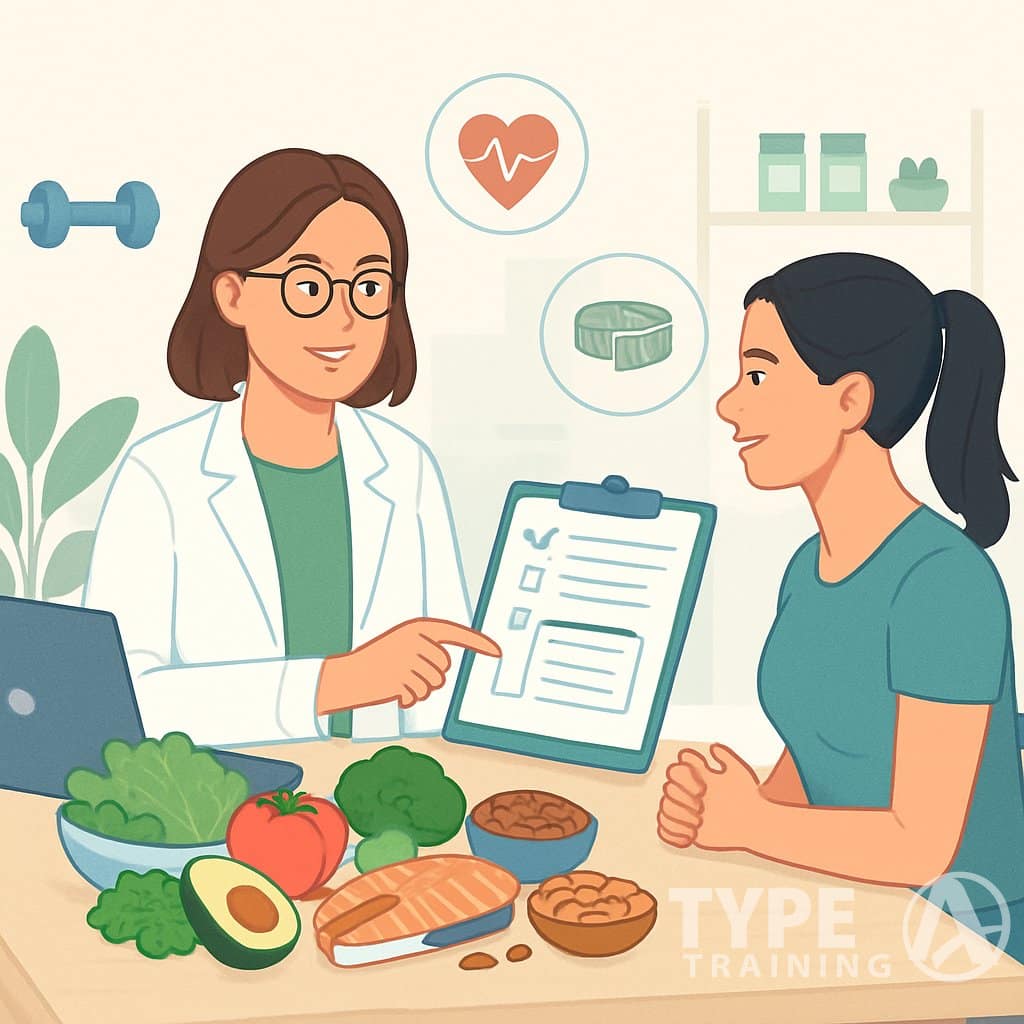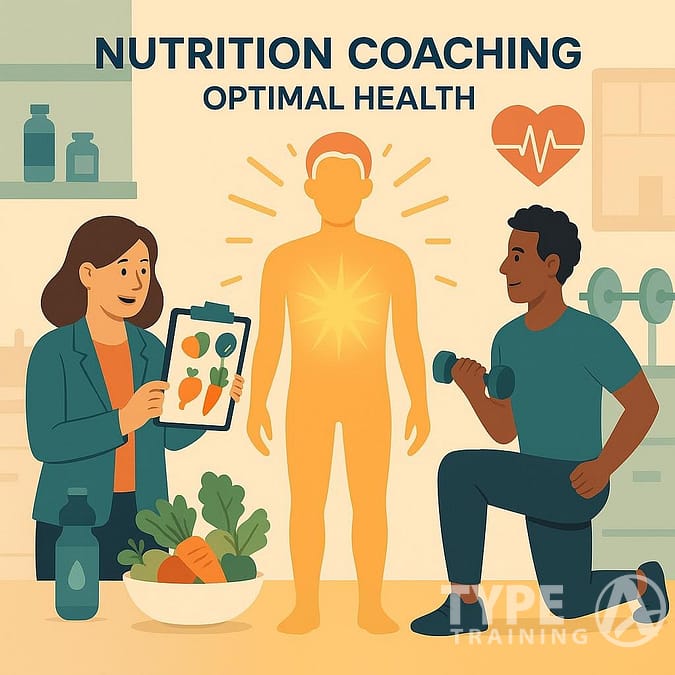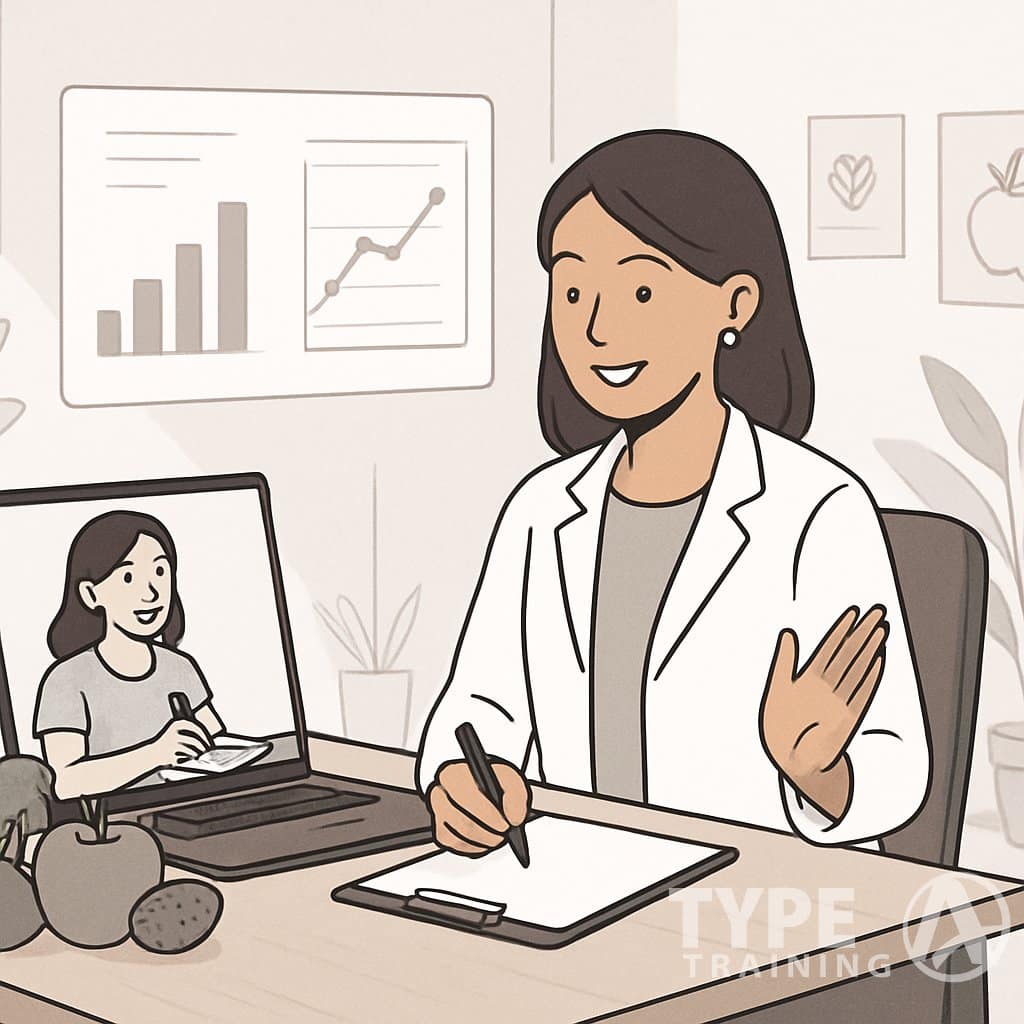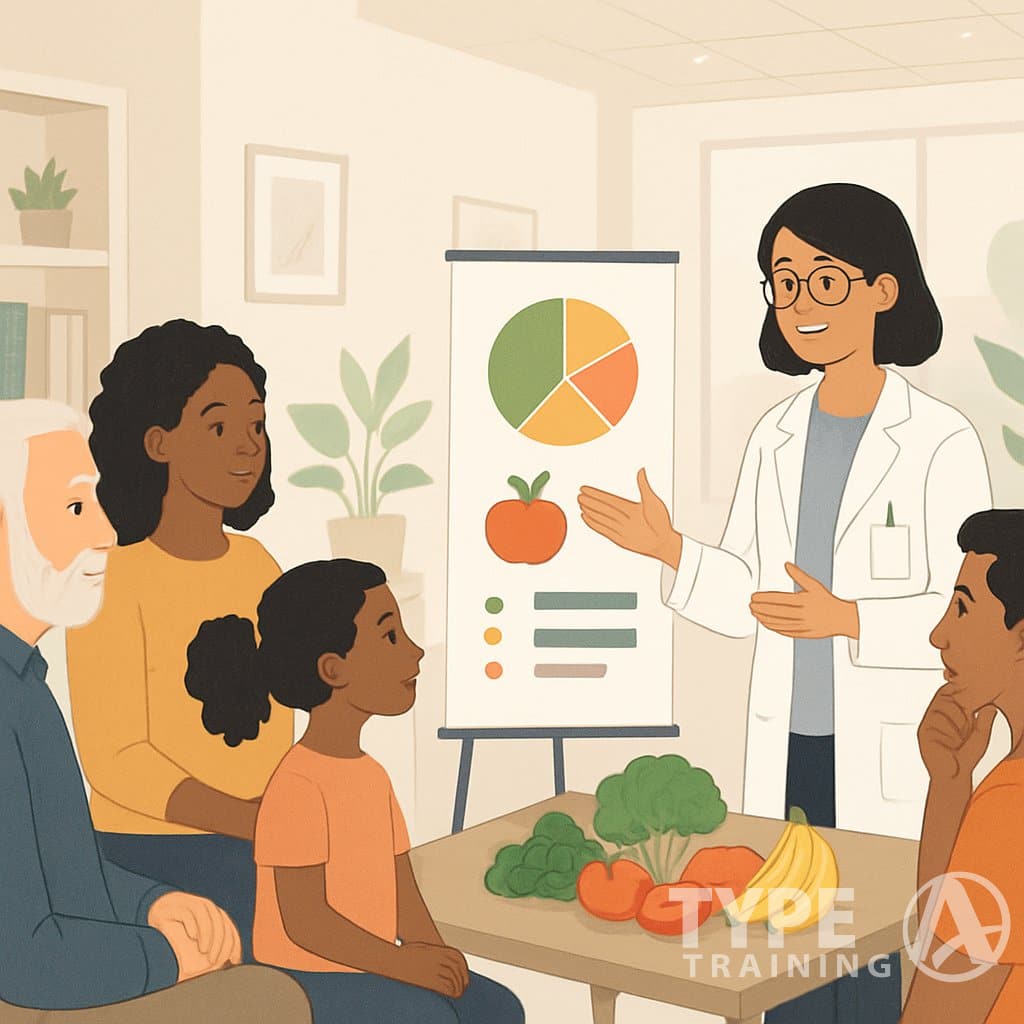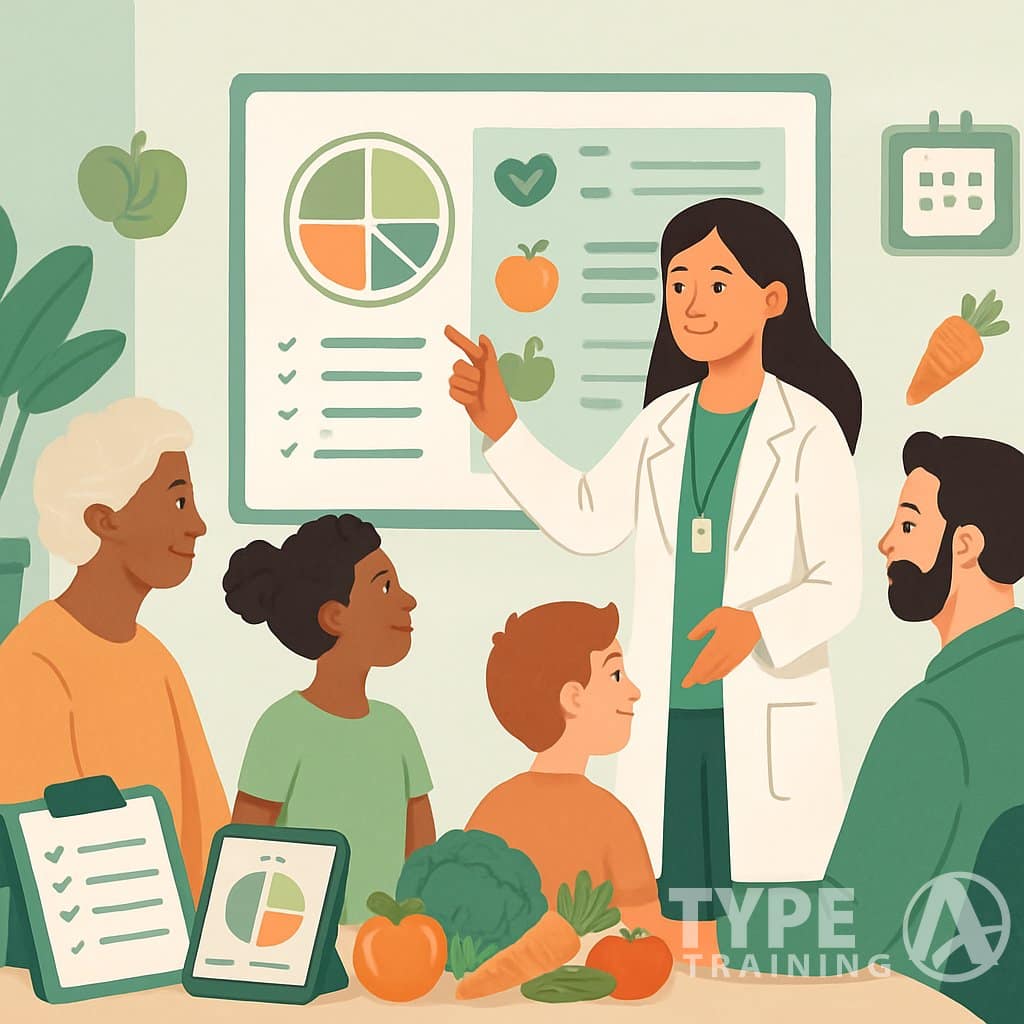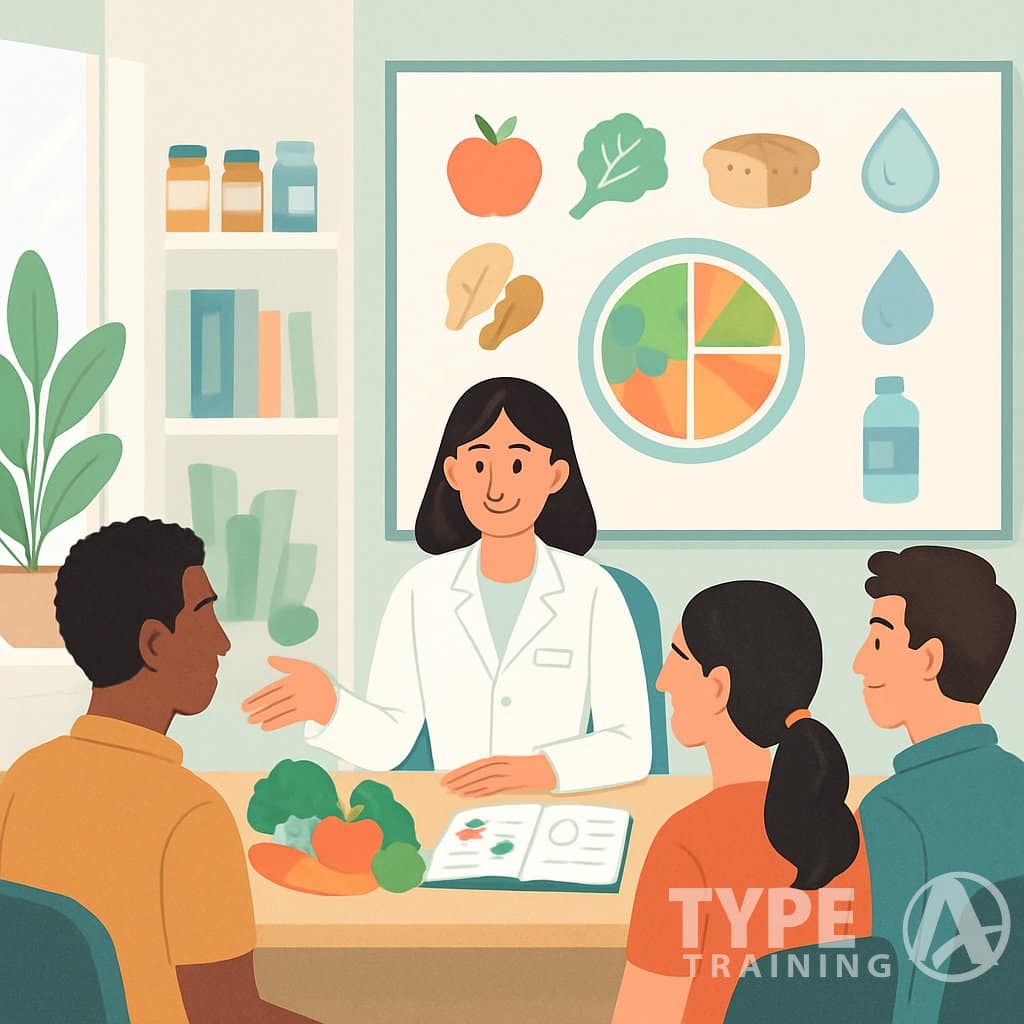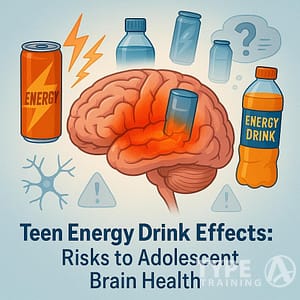Lots of people want to eat better, but figuring out where to begin or how to stick with it can feel overwhelming. If you’ve ever felt lost in a sea of diet tips online or wondered if you actually need someone to guide you, well, you’re not alone.
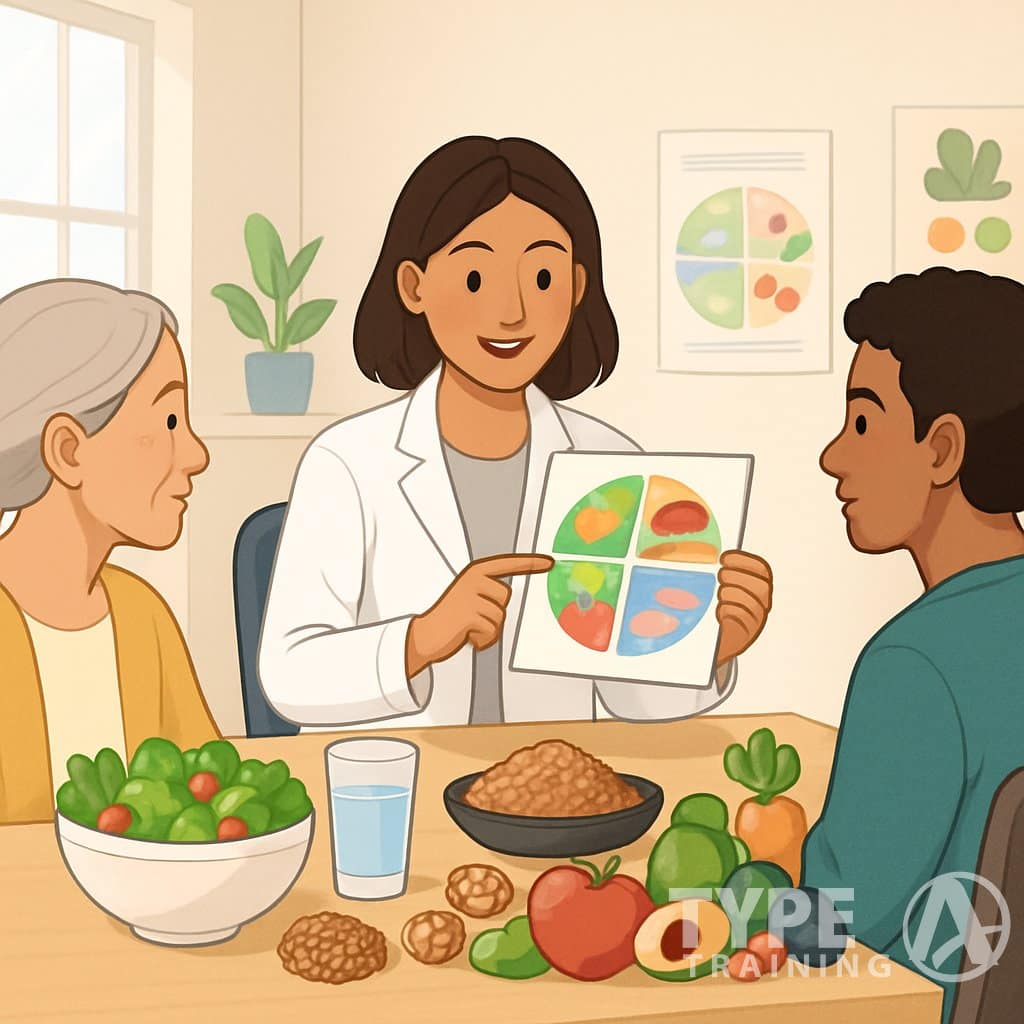
Nutrition services give you personalized support from trained pros who help you build an eating plan that fits your life, your health, and your goals. These can be as simple as meal planning or as specific as medical nutrition therapy for health issues.
When you work with a nutrition professional, you skip the guessing. You get solid, science-backed advice—no more chasing after every new diet trend that pops up online.
Popular posts:
Key Takeaways
- Nutrition services offer advice tailored to your health goals and lifestyle
- Different nutrition professionals bring different expertise, from basic coaching to medical nutrition therapy
- Professional nutrition support means accountability, follow-up, and real strategies for lasting change
What Are Nutrition Services?
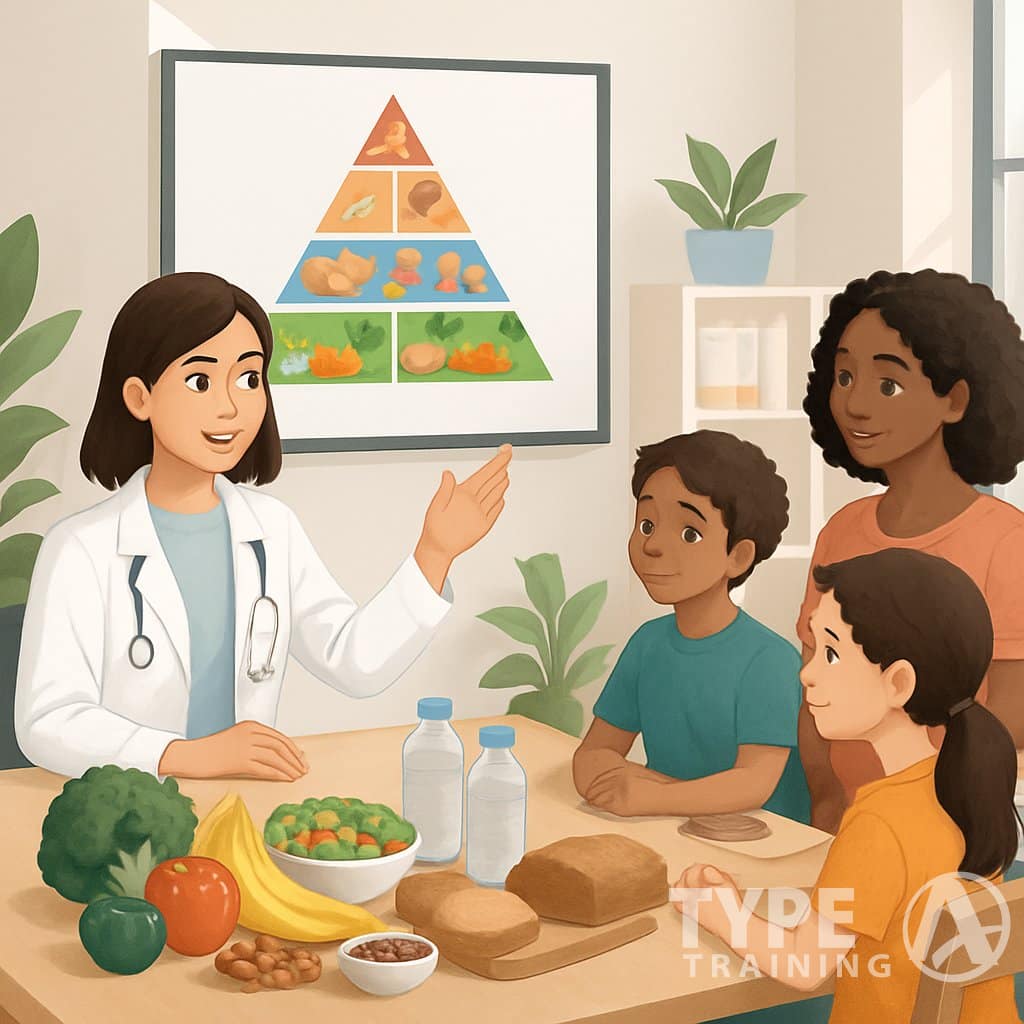
Nutrition services are programs that help you figure out and improve your eating habits. They connect you with experts who guide your food choices and help you work toward your health goals.
Registered dietitians and nutritionists usually run these services. They study food science and understand how your body uses nutrients.
Types of Nutrition Services Available
- One-on-one counseling – Personal sessions focused on your needs
- Group classes – Learn healthy eating basics with others
- Meal planning – Custom food plans for your lifestyle
- Medical nutrition therapy – Specialized support for health conditions
What You Learn in Nutrition Services
You’ll get the basics about what makes up your food. There’s a focus on macronutrients like carbs, proteins, and fats—your body’s main energy sources.
You’ll also learn about micronutrients such as vitamins and minerals. Think B vitamins for energy or calcium for strong bones.
How Services Help You
Nutrition pros show you how to balance different food groups in your meals. They’ll point out which foods pack in the nutrients you need most.
You get real-life tips for shopping, cooking, and even eating out. The goal? Make healthy choices work for your actual day-to-day life.
These services can help with all sorts of goals. Whether you want to lose weight, manage diabetes, or just eat a little better, there’s a way forward.
Related: Nutrition Coaching in Manhattan: How It Works
Nutrition Coach Vs. Nutritionist Vs. Dietitian

Knowing the difference between a registered dietitian and a nutritionist will help you pick the right one for your personal needs.
Registered Dietitians have the most training. They earn a bachelor’s degree in nutrition or something similar, finish an internship, and pass a national exam.
Dietitians work in hospitals and can provide medical nutrition therapy. They diagnose nutrition problems and design treatment plans. Insurance usually covers their services.
Nutritionists often have less formal training. Their qualifications depend on the state. Some hold degrees, others just certificates.
Nutritionists focus on general wellness and healthy eating. Most can’t provide medical nutrition therapy. They usually help clients who want to boost overall health.
Nutrition Coaches usually train through short certificate programs. They know the basics of nutrition and behavior change.
Coaches help with meal planning and lifestyle tweaks. They’re there to motivate and support you. They can’t give medical advice or treat health conditions.
| Professional | Education Required | Can Treat Medical Issues | Insurance Coverage |
|---|---|---|---|
| Dietitian | Bachelor’s degree + internship | Yes | Often |
| Nutritionist | Varies by state | Limited | Sometimes |
| Nutrition Coach | Certificate program | No | Rarely |
Pick based on what you need. For medical problems, go with a dietitian. For general wellness, a nutritionist is a good choice. If you just want some support and motivation, try a nutrition coach.
Related: Nutrition Coach vs. Dietitian: Which Do You Need in Manhattan?
The Benefits Of Personalized Nutrition Services
Personalized nutrition services build eating plans that truly fit your body and lifestyle. This works better than one-size-fits-all diets because it’s about you, not just some generic advice.
Better Energy Levels
When your meals are tailored for your body, you get steady energy. The right mix of whole grains, lean proteins, and healthy fats keeps you going strong.
Improved Digestion
Your plan includes foods that help your digestion. You absorb nutrients better and deal with fewer stomach issues. You’ll get the right kind of fiber for you.
Stronger Immune Function
Balanced meals with the right nutrients help your immune system stay tough. You get the vitamins and minerals you need from the foods that work best for you.
Enhanced Mental Clarity
Good nutrition supports brain function. When you eat what your body needs, you might notice sharper focus and clearer thinking.
Long-term Success
These services teach you healthy eating habits you can actually stick with. You’ll learn to build balanced meals with:
- Fruits and vegetables for vitamins and fiber
- Lean proteins for muscle and hormones
- Whole grains for steady energy
- Healthy fats for your brain
Your plan also covers hydration and meal timing. It’s about building a healthy lifestyle that feels natural, not forced.
Related: The Benefits of Personalized Nutrition Services
Types Of Nutrition Services Available
There’s a wide range of nutrition services out there to help you eat better. Some are run by the government, others are private or community-based.
Government Food Assistance Programs like SNAP, WIC, and the National School Lunch Program help people with lower incomes get healthy food. They also teach families and kids about nutrition.
Individual Nutrition Counseling pairs you with a registered dietitian. They make meal plans for your health needs. You can get practical meal prep tips and find out which proteins work best for you.
Community Nutrition Programs offer classes and workshops locally. Many teach cooking skills and meal planning. Some show you how to use local produce in your meals.
Online Nutrition Resources give you tools and handouts you can print at home. You’ll find healthy eating guides, recipe collections, and free meal planning templates online.
| Service Type | What You Get | Best For |
|---|---|---|
| Food assistance | Free or low-cost food | Low-income families |
| Individual counseling | Personal meal plans | Specific health goals |
| Community programs | Group classes | Learning cooking skills |
| Online resources | Digital tools and guides | Self-learning |
Workplace Nutrition Services are sometimes offered by employers. These could be healthy cafeteria options, nutrition talks, or even access to dietitians as a benefit.
School-Based Services help students and families learn about nutrition. They often include meal programs and classes about healthy eating.
Related: Types of Nutrition Services Available: A Complete Overview
What To Expect From Your First Consultation
Your first nutrition consultation usually takes about an hour. The dietitian will ask you to fill out some forms ahead of time.
You’ll talk about your goals and why you’re seeking nutrition help. Be open about your eating habits and health history—it really helps.
The nutritionist will look at what you eat now, asking about your daily meals and snacks. This helps them spot what’s working and what might need to change.
Key topics you’ll cover:
- Your relationship with food
- Medical conditions or medications
- Exercise habits
- Sleep and stress
- Past diets you’ve tried
You’ll learn about reading nutrition labels. That means figuring out serving sizes and spotting sneaky added sugars.
Portion control comes up a lot. Your nutritionist will show you what a normal serving looks like for different foods.
The dietitian will explain food labels in a way that actually makes sense. You’ll see what to look for and what to skip when you shop.
Your nutritionist won’t:
- Judge what you eat
- Put you on a super strict diet
- Make you feel bad about your choices
They’ll build a personal plan just for you. You’ll set realistic goals that you can actually reach.
By the end of your first visit, you’ll have clear next steps. You’ll know what to expect from future sessions, too.
Related: First Nutrition Coaching Session: Prep & Success Tips
Nutrition Services For Specific Goals
Nutrition services come in all shapes and sizes, each designed for different health and fitness goals. What you need depends on what you want to achieve.
Weight management is a big one. Dietitians set up meal plans to help you lose, gain, or maintain weight in a safe way.
They figure out the right calories and nutrients for your body. It’s more personal than you might think.
Muscle building takes a different approach. You’ll need more protein and careful meal timing.
Sports dietitians usually help with these goals, since it gets pretty specific. It’s not just about eating more—timing matters, too.
Athletic performance needs its own plan. The focus is on fueling your body before, during, and after workouts.
Sports dietitians design these plans for endurance or strength training. It’s all about what your sport demands.
Medical conditions add another layer. Dietitians help manage diabetes, heart disease, and digestive issues with the right food choices.
Here are some common goal-specific services:
- Custom meal planning for weight loss or gain
- Macronutrient calculations for muscle building
- Sports nutrition for athletic performance
- Medical nutrition therapy for health conditions
- Supplement guidance for specific needs
Finding the right fit really matters. Generic programs just don’t cut it for most people.
Qualified professionals who get your goals make all the difference. You want someone who listens and understands your needs.
Lots of nutrition services now offer goal-specific programs. Some team up with gyms for education and counseling.
Others focus on corporate wellness or medical nutrition therapy. There’s truly something for everyone.
Related: Nutrition Services for Specific Goals: Personalized Strategies
Integrating Nutrition Coaching with Exercise and Wellness
Nutrition and exercise are inseparable when it comes to real, lasting results. Training hard without proper nutrition limits progress, while eating well without movement only gets you part of the way.
By combining both, you fuel your body for performance, recovery, and overall wellness.
Because we provide both nutrition services and personal training, our approach bridges the gap.
We align your food choices with your workouts, lifestyle, and goals so you feel stronger, recover faster, and have more energy throughout the day.
How Nutrition and Exercise Work Together
| Focus Area | Nutrition Coaching Supports | Exercise/Wellness Impact |
|---|---|---|
| Energy | Balanced meals & timing | Stronger workouts, less fatigue |
| Recovery | Protein & anti-inflammatory foods | Faster muscle repair, reduced soreness |
| Performance | Fueling before/after workouts | Improved strength, endurance, and focus |
| Stress & Sleep | Mindful eating, stable blood sugar | Better rest, lower stress, improved mood |
Our coaching goes beyond food and fitness. We also address stress, sleep, and craving management — because true wellness is about balance.
Whether you’re an athlete, a gym-goer, or a busy professional, integrating nutrition with exercise ensures your plan works in real life and supports your long-term health.
Related: Curious how nutrition fits into your workouts and overall health? Read our full guide on Integrating Nutrition Coaching with Exercise and Wellness.
The Role Of Follow-Ups And Accountability
Follow-up sessions aren’t just a nice bonus—they’re essential. They help you stick with your goals and tweak your plan as you go.
Here’s what usually happens during follow-ups:
- Review of your progress and challenges
- Updates to your meal plan based on results
- Discussion about your schedule and stress
- Support for building healthy habits
Your nutrition pro will check how your plan is working. They’ll ask about your energy, weight, and just how you’re feeling in general.
Accountability keeps you going. Regular check-ins make it harder to fall off track. Knowing someone will ask about your progress really helps.
Follow-up care helps you build long-term healthy habits. Quick fixes? They never last. Ongoing support makes new habits stick.
Common follow-up topics include:
- Meal planning struggles
- Eating out challenges
- Mindful eating practices
- Food prep tips
- Managing cravings
Your provider will adjust your plan as things change. What works one week might not work the next.
Most people need several follow-ups to see real change. It takes time to build new habits, and that’s totally normal.
Related: Why Nutrition Follow-Ups Are Key to Long-Term Success
Related: The Importance of Accountability in Nutrition Coaching
Common Myths About Nutrition Services
Plenty of myths float around about nutrition services. Sometimes these ideas stop people from getting the help they need.
Myth 1: Dietitians only help with weight loss
Nope. Nutrition pros deal with way more than just weight. They help with diabetes, heart health, allergies, and more.
Myth 2: Nutritionists ban all your favorite foods
Most don’t. Usually, they help you find balance and keep your favorites in the mix.
Myth 3: You only need nutrition help when you’re sick
You can see a nutrition expert anytime. Even healthy people benefit from better energy and habits.
Myth 4: Nutrition advice is the same for everyone
Not true. Everyone gets different advice based on their health, age, and lifestyle.
Myth 5: Natural products like herbal teas are always safe
Some herbal teas can mess with medications. Nutrition pros can tell you what’s safe for you.
Myth 6: Nutrition services are too expensive
Many insurance plans cover visits. Some community centers even offer low-cost help.
Myth 7: You can get the same help from the internet
Most online info is outdated or just plain wrong. Real professionals give advice that actually fits you.
Related: Common Myths About Nutrition Services: Facts vs Misconceptions
How To Choose The Right Nutrition Service For You
Picking the right nutrition service? Start with what you need. Think about your goals—weight loss, managing a condition, or just eating better?
Consider your budget and time. Some services cost more. Group classes are usually cheaper than one-on-one sessions.
Online programs might fit your schedule better. Flexibility matters, especially if you’re busy.
Check the credentials of any nutrition professional. Look for these:
- Registered Dietitian (RD) or Registered Dietitian Nutritionist (RDN)
- Licensed in your state
- Experience with your needs
- Good reviews from clients
Different services work for different people. Individual counseling gives you personal attention. Group workshops let you learn with others and usually cost less.
Online programs are flexible but less personal. There’s a trade-off, so think about what matters most to you.
Ask questions before you decide. Find out how they approach nutrition. Make sure they use science, not fad diets or quick fixes.
Location matters too. Would you rather meet in person or online? Some people need face-to-face support, others love the ease of video calls.
Trust your gut. The right pro listens, respects your concerns, and explains things in a way that makes sense to you.
Related: How to Choose the Right Nutrition Service: Expert Guidance
Frequently Asked Questions
People have all sorts of questions about nutrition services. From diet basics to finding the right pro, it’s a lot to sort through.
What are the essential components of a balanced diet for overall health?
A healthy eating pattern means eating from all the basic food groups. You want enough nutrients from real, nutrient-dense foods.
Balance your calories in and out. That’s how you reach and keep a healthy weight.
Try to limit solid fats, added sugar, salt, and alcohol. Whole foods beat processed stuff every time.
Fruits, veggies, whole grains, lean proteins, and dairy or alternatives should be in the mix. Each group brings different vitamins and minerals to the table.
How can nutritional counseling benefit someone with specific dietary needs?
Registered dietitians offer personalized nutrition counseling for all sorts of health issues. They handle gut health, hormones, weight, diabetes, and more.
You can get help with insulin resistance, thyroid stuff, and heart health. Dietitians build plans for your exact medical needs.
They’ll do a nutrition assessment and ask about your history and eating habits. That’s how they make a plan that actually fits your life.
What should one expect during the first consultation with a nutritionist?
Your dietitian will look at your medical history and current eating habits. They’ll ask about your health and nutrition goals.
Expect a nutrition assessment at your first visit. It helps them spot what’s working and what could use a change.
You’ll get to know your dietitian and talk about your concerns. They’re there to help, not judge.
The first appointment is about gathering info and setting real, doable goals. Your dietitian will explain how they can help you move forward.
What are the qualifications to look for when choosing a professional nutrition service provider?
When you’re searching for nutrition services, start by looking for a registered dietitian (RD). These folks go through specific education and training before they can even call themselves that.
To become an RD, you have to pass a national exam. There’s also a supervised practice part—nobody skips that step.
Dietitians keep their credentials up to date with continuing education. It’s not a one-and-done thing.
Usually, you’ll need a referral from your doctor to see an RD for nutrition support. That way, your nutrition care gets proper medical oversight.
It’s smart to check if the provider has experience with your particular health issue. Some dietitians focus on things like diabetes, heart disease, or digestive problems.
How does personalized nutrition planning differ from general dietary guidelines?
General dietary guidelines are just that—general. They’re basic recommendations for everyone, but they don’t consider the details of your life.
Personalized nutrition planning is a whole different ballgame. Your dietitian takes your medical history, food likes and dislikes, and lifestyle into account.
This kind of plan works with your needs, not just what’s written in a handbook. It can factor in your medications, allergies, and even cultural food traditions.
Dietitians also think about your schedule and how comfortable you are in the kitchen. If you hate cooking, they’re not going to hand you a five-course meal plan.
Can nutrition services assist in managing food allergies and intolerances?
Nutrition services can really help you handle food allergies and intolerances in a safer way. Dietitians show you how to avoid trigger foods but still eat well.
They’ll teach you how to read food labels and spot hidden allergens in processed foods. You get tips on which ingredients to look out for and where to find safer options.
Dietitians can put together meal plans that skip the problem foods but keep all the nutrients you need. That way, you don’t end up missing out just because you have to avoid certain things.
They offer advice for eating out and dealing with social situations, too. You’ll pick up some useful strategies for handling restaurants or parties when you’ve got dietary restrictions.
Didn’t find your answer? Visit our full Nutrition Services FAQ



